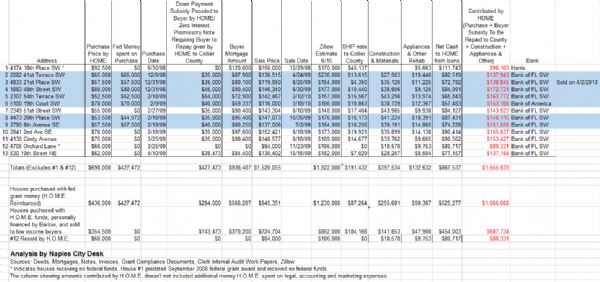|

In-depth Stories on People, Politics & Business
This Story is Free!!
Get access to the Naples City Desk Archive fo only $4.99 a month.
SEE RELATED STORIES from the archive:
Low-income H.O.M.E. buyers up $1 million on house gains, yet charity, county hit by Brock, HUD
Updated: HUD requires Collier County to pay back feds $427K related to H.O.M.E. grant
H.O.M.E. has already given Collier County $427,472 worth of notes
Activists from 20 churches: Collier Clerk’s excess red tape holding up fed money for homeless, needy
St. Matthews House no longer seeking fed funds because of Clerk; $1 million fed money left not spent last year
H.O.M.E. lawyers ask federal law enforcement to investigate Brock, others for abuse of power
Fed scrutiny needed so other charities aren’t harmed by unfair audits, HUD grants admin, H.O.M.E. says
Henning: Community needs closure on H.O.M.E., says his vote not political
Brock: Federal housing officials not satisfied that 2008 H.O.M.E. grant was properly accounted for
Docs turned over in Naples City Desk public records lawsuit show deeper involvement by Brock, staff in audit
More than 300 pages of key documents surface after Brock’s office said all public records turned over
Appraisals reviewed by Brock’s own staff 2 years ago document construction Brock says not proven
Naples City Desk investigation: Internal documents show Brock allegations false, misleading
|
By Gina Edwards
Naples City Desk
Collier County has told federal housing officials at HUD that it disputes that environmental reviews are missing for a seven-year-old charity housing grant project spearheaded by John Barlow, the retired CEO who challenged Clerk of Courts Dwight Brock for political office in 2012.
HUD pointed to the allegedly missing environmental reviews on the seven-year-old federal grant as a basis for requesting that the county pay back a $427,472 grant it gave to H.O.M.E., the non-profit founded by Brock’s 2012 political opponent for office, Barlow and other business leaders.
HUD opened its inquiry in response to a request by Brock and many of the issues raised in a June 8, 2015 letter HUD sent the county mimic allegations raised against H.O.M.E. by Brock in May 2014. Brock raised some new allegations against H.O.M.E. in May after H.O.M.E.’s leaders publicly disputed Brock’s earlier findings, released thousands of pages to the media and said Brock was abusing his elected office to take down political opponents. Brock denies a political motivation.
County officials said they may have additional responses to HUD’s letter and reminded HUD that HUD had asked the county for just a fraction of its documents — files for just one sample property — last year.
In a June 12 letter to HUD, Collier County says that it has environmental reviews for all the houses that H.O.M.E. purchased, renovated and re-sold to low-income buyers.
“The inference that the County has no environmental review documentation is in error,” Collier County Community and Human Services Director Kim Grant wrote. The county reminded HUD of a letter it sent to HUD officials last year in which it offered to provide HUD with the environmental review files upon request.
On Tuesday, Collier Commissioner Tom Henning will ask his elected colleagues to vote to ask the county attorney to review whether to file a lawsuit against H.O.M.E. to recoup the “$427,472 and any program income received from non-federal funds.”
“Due to discrepancies both financial and ethical by H.O.M.E.’s executives and staff, the County Attorney should be directed to investigate the entire matter, and if appropriate, file suit against H.O.M.E., its Executive Director, and COOs and CFOs involved with the matter at this time in order to make the taxpayer and County whole without fiscal impact,” Henning wrote for the agenda item up for vote Tuesday.
|

John Barlow, retired CEO and 2012 candidate for Clerk of Courts running against incumbent Dwight Brock
|
Attorneys for Barlow say the grant program was successful, the grant money was properly spent and accounted for, that H.O.M.E. didn’t make any profits or “program income” on the grant, and that Brock reopened scrutiny of the closed-out grant as part of a “political vendetta” and chilling “political takedown” and smear campaign against Barlow and other H.O.M.E. board members.
Board members of H.O.M.E., an all-volunteer organization with no paid staff, included Gina Downs, who previously ran for office against Collier Commissioner Georgia Hiller. Barlow and Downs filed a successful state ethics complaint against Commissioner Henning regarding his financial disclosure forms. Brock reopened his audit of H.O.M.E. the month after Henning’s ethics case was completed and he was fined $500.
|

Gina Downs, H.O.M.E. Board member and 2010 Commission Candidate. Filed Ethics complaint against Henning
|
Barlow’s attorneys called on federal officials to investigate a misuse of power by Brock. (See H.O.M.E. Letter to HUD in May 2014)
H.O.M.E. board member Russell Budd said H.O.M.E. did a good thing by fixing up 11 blighted houses and helping 11 low-income families purchase homes.
The 11 blighted houses purchased and rehabbed by H.O.M.E. collectively are now worth almost $1.9 million based on Zillow estimates reviewed by Naples City Desk, or almost $1 million more than the low-income buyers owe on their mortgages. The houses H.O.M.E. bought had code violations and damage and they received extensive remodels with new kitchens, roofs, baths, A/C units, flooring, appliances and other upgrades.
If the low-income buyers were to resell the houses today, and pay back the county and the state the subsidized notes, they would come out ahead by $400,000 based on Zillow value estimates. (See Related Story)
Brock told HUD in his May 2014 letter, in an allegation he raised after his initial January 2014 allegations received public scrutiny, that he had concerns that buyers may have been victimized because first mortgages and the subsidy notes exceeded the appraised values of the houses at the time. Appraisers noted on their reports that values were depressed because of the large amount of foreclosures in the area then.
In its recent letter, HUD said “Our review of appraisals disclosed that mortgages exceeded appraised value.”
H.O.M.E. said the notes – designed to offer down payment assistance and lower the purchase price to buyers -- were aimed at preventing the low-income buyers from flipping the houses.
H.O.M.E. gave Collier County $427,472 worth of notes on 11 of the houses it sold to low-income buyers in 2011. The county will receive that money in 30 years or whenever the houses resell, whichever is sooner.
The notes are an asset and Brock is the county’s official accountant and custodian of funds.
One of the houses was resold in 2013, according to Zillow, but the sale is not reflected in the Official Records kept by the Clerk of Courts.
An investigation by Naples City Desk in 2014, “Good Deeds: Punished,” found that Brock’s staff urged county officials to not accept the notes in 2011 and pull a vote to accept the notes from Collier Commissioners’ agenda.
|

Click chart for View Detailed Analysis by Naples City Desk
Zoom in with control at top right.
|
Brock told Naples City Desk last year that H.O.M.E.’s assignment of the notes to Collier County didn’t count as a return of program income to Collier County because Collier Commissioners hadn’t voted to officially accept the notes. In his letter to HUD, Brock wrote that H.O.M.E. attempted to assign the notes to Collier County “with no evidence of acceptance.”
A Naples City Desk investigation found that Brock made misleading allegations and statements about the H.O.M.E. grant project and a consultant in public statements when he lobbied Collier Commissioners to go to law enforcement and write a letter to HUD in January 2014. Brock said H.O.M.E. “stole” funds and that construction couldn’t be substantiated. Naples City Desk found appraisal reports reviewed by Brock’s own staff that documented extensive renovations including with photos.
Later, Brock offered some new and different allegations against H.O.M.E. in a letter sent to HUD in May 2014. Consistently, Brock has said H.O.M.E. board members had conflicts of interest and HUD’s recent letter raised concerns about conflicts of interest and said H.O.M.E. board members received financial benefit.
H.O.M.E. officers deny that H.O.M.E. officers received any financial benefit. Barlow’s attorney, Jeff Fridkin, said the members of the all-volunteer board thought they were doing favors to help H.O.M.E. and the allegations that board members received financial benefit is false.
All of the $427,472 federal grant was used by H.O.M.E. to purchase 7 foreclosed houses, which H.O.M.E. renovated and sold to low-income buyers, who also received a down-payment subsidy from H.O.M.E. Brock’s Finance Director Crystal Kinzel erroneously told a consultant that H.O.M.E. used profits, or so-called program income, on the federally purchased houses to buy other houses, according to public record memos obtained by Naples City Desk. In fact, all of the 11 houses in the program were purchased by H.O.M.E. before the first house was sold. H.O.M.E. got reimbursed with federal money for the purchase of seven houses.
H.O.M.E. used private funds, personally financed by Barlow, to purchase five blighted houses, four of which H.O.M.E. renovated and sold to low-income buyers. The other house owned by H.O.M.E, H.O.M.E. resold at a profit.
Kinzel, simultaneously serving as internal audit director and Clerk’s Finance Director that authorized grant payments, also directed the consultant to include houses that received no federal money in the federal program profit calculations, according to public records obtained by Naples City Desk. She has denied wrongdoing.
In the recent letter, HUD officials in the Miami Office seemed to be unclear about the seven-year-old grant. “It appears that H.O.M.E. Inc. had homes it already owned; it is not clear as to how many.” H.O.M.E. attorneys sent a detailed explanation to HUD’s Inspector General in Washington, D.C. last year.
Federal grant rules say that private funds contributed to a project should be accounted for and that program income calculations should be pro-rated accordingly. H.O.M.E.’s accountants say less than a third of the total housing project was federal public money.
|

Clerk of Courts, Dwight Brock
|
Brock told commissioners he hired an “independent auditor” to calculate program profits to avoid the appearance of impropriety of going after his political challenger. But documents obtained in a public records lawsuit filed by Naples City Desk showed the so-called independent auditor was working as a consultant taking direction from Brock’s staff. Brock’s staff had withheld public records on H.O.M.E. but earlier stated they had turned all the records over to Naples City Desk.
Last week, Brock claimed vindication in a press release following the letter from HUD’s Miami office to the county saying he had questioned “the oversight and monitoring of the H.O.M.E. program, including concerns with appraisals, program Income, multiple conflicts of interest, lack of documentation, reasonableness of costs, and the use of program income.”
The Naples Daily News reported that Brock’s staff believes H.O.M.E. owes more than $300,000 in program income.
Last year, activists from 20 area churches publicly criticized Brock’s slow payouts and excess scrutiny of grants for low-income housing. The area’s largest homeless shelter, St. Matthews House, said last year it would no longer seek federal grants because of the excessive red-tape by Brock and invoices that Brock’s staff took 11 months to pay.
Brock did not respond to an interview request from Naples City Desk about the recent HUD letter.
Correction: An earlier version of this story stated that one of the H.O.M.E. houses, with a $35,000 note assigned to Collier County, sold in 2013 based on Official Records. The sale is listed on Zillow, but not in the Official Records kept by the Collier Clerk of Courts.
Reporting By: Gina Edwards
Date: June 22, 2015
Contact Gina Edwards at ginavossedwards@gmail.com or by phone at 239-293-3640.
|

